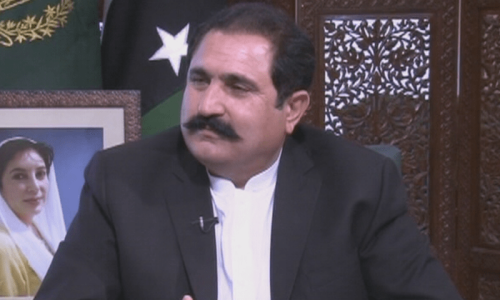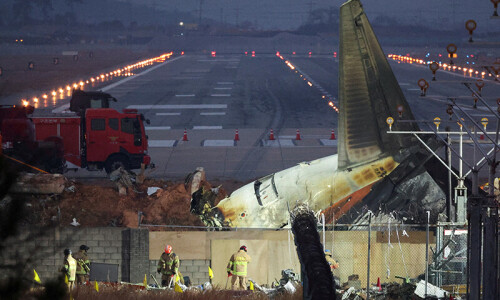THE two concurrent sessions of the National Assembly and the Senate called over the weekend suggest that the government feels confident of reaching the two-thirds majority required in each House to pass a constitutional amendment bill aimed at making possible what it sees as a more sympathetic judiciary.
The million-dollar question that will remain unanswered is whether these changes in the Constitution, side by side with changes in the rules governing the Supreme Court such as those encapsulated in the Practice and Procedures Act, will lead to the sort of stability seen as a pre-requisite to economic development.
Such stability has eluded the country ever since the Nawaz Sharif government was destabilised around a decade ago and continued through the ushering in of the Imran Khan government in 2018 and then his ouster and the abnormally long tenure of the caretaker government. There has been little change in the ground reality since last February’s election.
As things stand, the civilian politicians in power and their backers in the military both believe that the superior judiciary (excluding the chief justice) is placing roadblocks in the path of whatever they have planned for the country and, therefore, the judges’ wings have to be clipped so they can’t do, as the hybrid set-up perceives, all that they do to help Imran Khan and his party.
Will the changes to the Constitution — if not blocked — lead to the stability seen as a pre-requisite to economic development?
For years, under the various military rulers, the superior judiciary remained largely compliant and instances of individual defiance in upholding the rule of law and the Constitution were few and far between. Therefore, they had minimal impact on the decision-making environment which remained arbitrary, whimsical and mostly driven by the autocrat’s desires.
However, when military ruler Gen Pervez Musharraf tried to get rid of the man he had handpicked earlier to be chief justice in 2007, the latter refused to resign and was suspended. This triggered a lawyers’ movement for his restoration and journalists and political parties also joined it.
There is no point in writing many paragraphs recalling what happened as events are too recent to forget. On the face of it, the chief justice’s institution rallied behind him and he was restored. This weakened Musharraf who had to hold elections that saw PPP forming a government in Islamabad and the PML-N in Lahore — though not before he sent the entire judiciary home and installed puppets in 2007; the judiciary was restored again after public protests led by the PML-N in 2009.
Post-elections, faced with an impeachment threat, Musharraf left the presidential office and was replaced by PPP’s Asif Zardari who got the most votes in the electoral college, comprising all elements of the country’s parliament including the provincial assemblies. Although it wasn’t clear then, it was not just the popular movement that saw Musharraf’s ouster; an influential faction within the military also, quietly, supported that change.
In his new life, CJP Iftikhar Chaudhry, a seemingly small man got enormous powers, and started to run all but a parallel administration and put obstacles in the path of the running of a smooth government by the PPP. His hostility to the PPP was intense and led to the ouster of elected prime minister Yousuf Raza Gilani.
Many of Mr Chaudhry’s decisions cost Pakistan dearly such as the one on Reko Diq. His critics also cite his decision on Pakistan Steel, which stopped its privatisation and eventually led to its demise. These are just a few in a plethora of judgments.
But as this particular CJP tightened his grip on the Supreme Court, he won the support of the entire bench and it stood as one behind his decisions and transgressions alike. It was surprising to see justices of immense merit, competence and credibility also agreeing with him even in cases where the opinion among the top legal experts was different.
It was during his heyday that he threatened parliament with striking down any legislation which included a meaningful role for elected lawmakers in judicial appointments, and monopolised all such elevations. This threat fitted in with his high-handed behaviour with all who appeared before him, whether politicians or senior civil servants or police officers.
If Chaudhry lowered the bar for both judgments and conduct, one of his successors, Saqib Nisar, obliterated all standards. He seemed to dance to the tune of the powerful intelligence bosses and acted obnoxiously in public with a large number of people, many of whom were left wondering as to what they’d done to deserve such treatment by the man tasked with delivering justice to all Pakistanis.
It may have been Saqib Nisar and his cohorts who finally ended up spoiling the establishment to the point that they started to take as normal total compliance with their ‘requests’. Now when the establishment has put its money on a different horse, it has been troubled by many senior members of the judiciary not playing ball. Hence, the hybrid set-up’s ‘need’ to control some outcomes by controlling who gets or keeps the top job and other key positions in the high courts and the Supreme Court.
As these lines were being written, the apex court issued a clarification on the ECP’s request to clearly spell out that 41 elected members who did not submit their affiliations after the short Supreme Court order be treated as PTI members. It isn’t clear if some of them were among those the government was relying on to reach a two-thirds majority in the National Assembly and could stymie the move.
Whatever happens, two things won’t change. The first is that the judiciary seems gung-ho in safeguarding its right to adjudicate as it deems fit. And the second is that Imran Khan and his party can’t be wished away. They remain defiant and seem even more relevant after their performance in the last election.
Against this backdrop, it is very difficult to see how Pakistan will attain the stability it so desperately seeks. If that stability remains elusive, its impact on the economy and the people can only lead to more upheaval. Could it be time to pull out the drawing board again?
The writer is a former editor of Dawn.
Published in Dawn, September 15th, 2024















































Dear visitor, the comments section is undergoing an overhaul and will return soon.